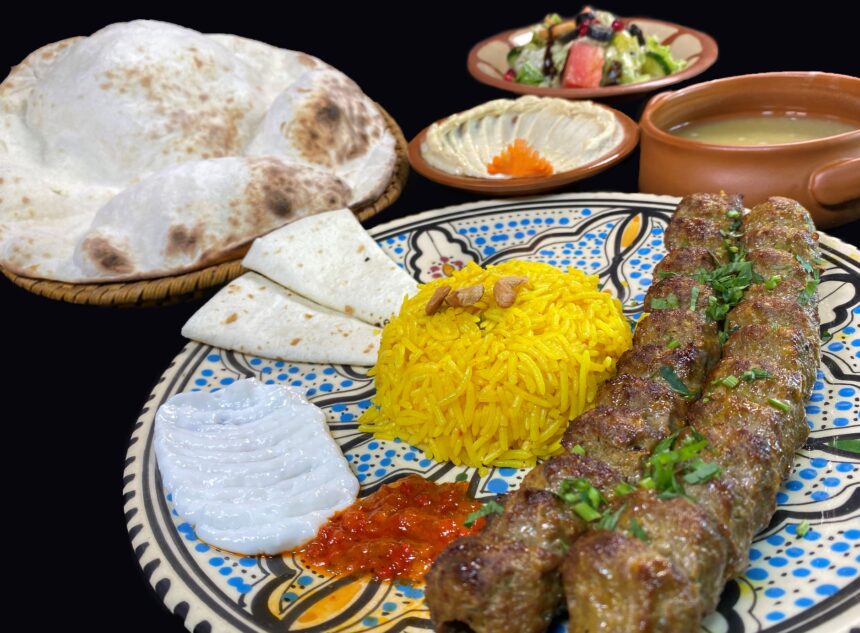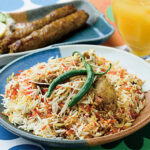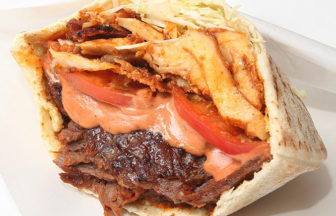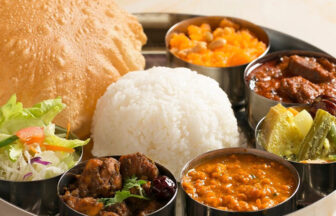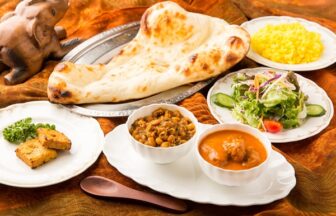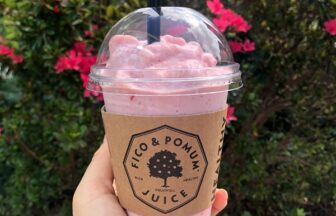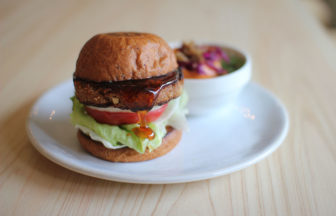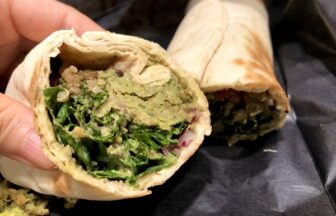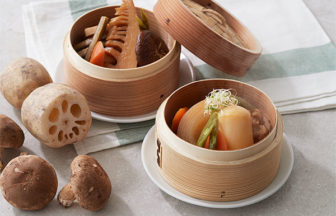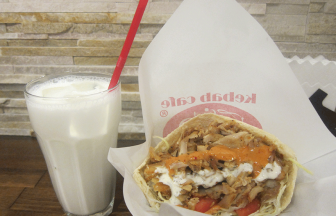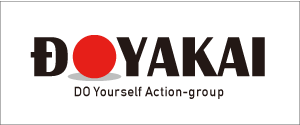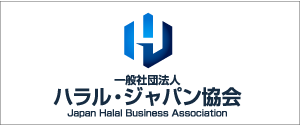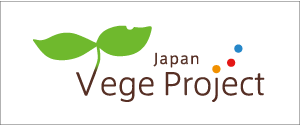Delicious and healthy! Zenobia, a rare Syrian-Arabic restaurant in Tokyo
Arabian Restaurant Zenobia is a Middle Eastern restaurant located a 3-minute walk from Hiroo Station on the Tokyo Metro Hibiya Line.
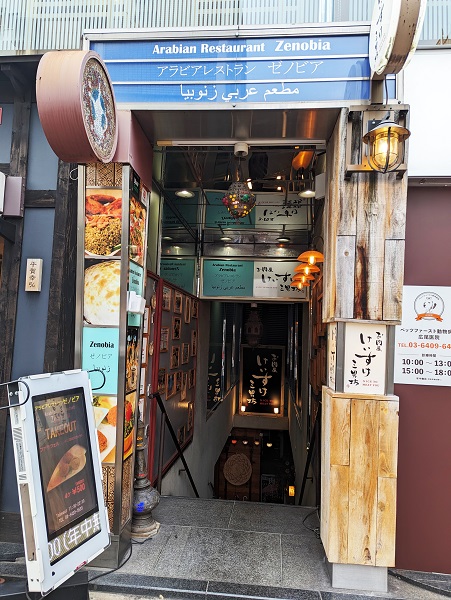
Inside Zenobia
Located in the basement of a building along Hiroo Walking Street, the restaurant’s interior is a stunning sight, featuring Arabic poetry, clocks with Arabic numerals, and Egyptian and Syrian décor. These are all from the owner’s personal collection, and he personally renovated and coordinated the entire space, creating an exotic and mysterious atmosphere, as if transported back to another era.
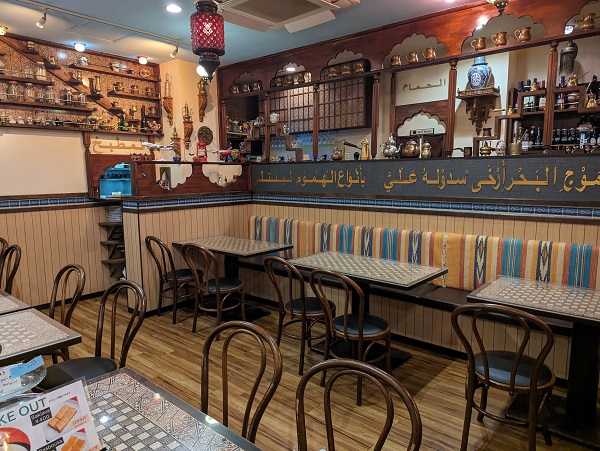
Inside Zenobia
The restaurant’s name, Zenobia, is said to be derived from Queen Zenobia of the ancient city of Palmyra. The owner, Ibrahim, is Muslim. Zenobia serves authentic Middle Eastern cuisine, primarily from Syria, the owner’s birthplace. Syria shares many similarities with its neighboring countries, bordering Turkey to the north, Iraq to the east, Jordan to the south, and Lebanon to the west. Middle Eastern cuisine is characterized by simple flavors that bring out the best in the ingredients, such as lemon, sesame, and olive oil. Chickpea hummus is a staple dish enjoyed throughout the Middle East. High in protein and healthy, it’s popular in Europe and the US, and is gaining popularity in Japan as well. Zenobia’s hummus is smooth and melts in your mouth, with a rich sesame aroma. It pairs perfectly with the soft, thinly-baked chapati. Though it’s a simple dish, it’s so popular in Syria that it’s said restaurants serving delicious kebabs and hummus never go out of business. While hummus and falafel are typically homemade dishes, it’s surprising to learn that many people buy them from restaurants or stores.
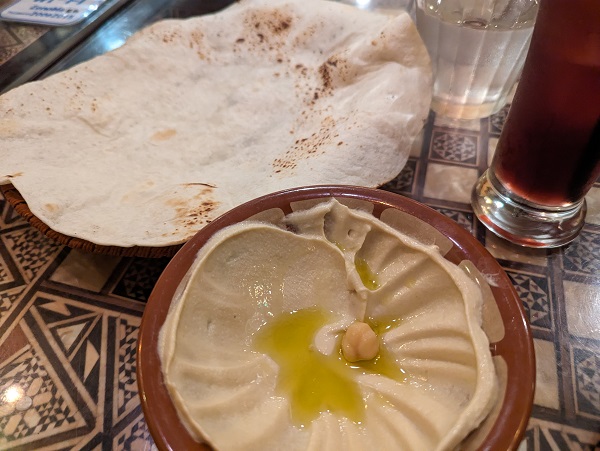
Hummus
Another Middle Eastern staple is tabbouleh salad, a refreshing salad featuring bulgur, plenty of parsley, garlic, olive oil, and a generous squeeze of lemon. Yarenji, rice and vegetables wrapped in grape leaves, is a Syrian favorite. This is a rare dish that’s hard to find in Japan.
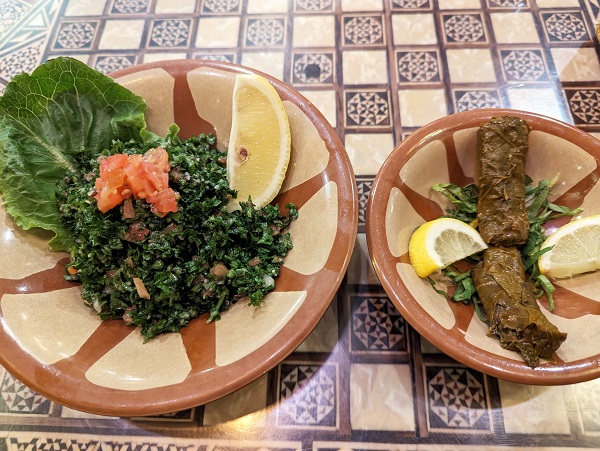
Tabouli Salad and Yarenji
Hummus, tabouli salad, and falafel are three essential dishes in Middle Eastern cuisine, and customers from Europe always order them. Healthy and nutritious, they’re halal and vegan, making them suitable for everyone, regardless of religion or nationality, except for those with allergies. During lunchtime, from 11:30 AM to 2:30 PM, you can enjoy Middle Eastern cuisine at a reasonable price, even if you’re dining alone. The most popular dish is the Arabian Lunch Plate, limited to 10 servings.
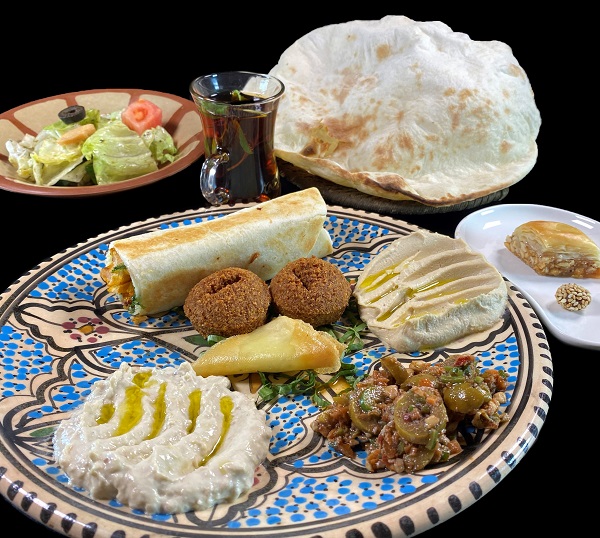
Arabian Lunch Plate ¥1,200
Includes three popular pastes, including hummus, falafel bean croquettes, shawarma chicken roll sandwiches, salad, naan, dessert, and a drink. For ¥1,200, you can enjoy a course meal of classic Middle Eastern cuisine. Takeout options, such as bento boxes, are also available.
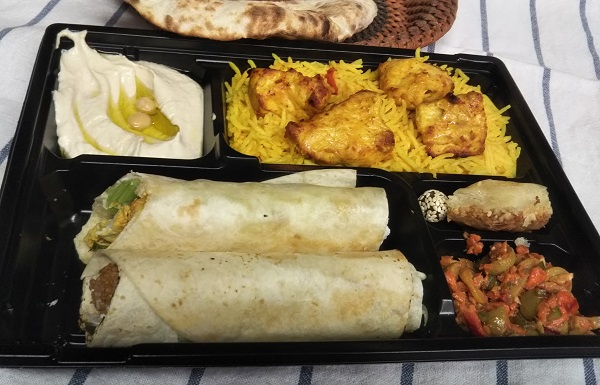
Lunch Box
All food items at Zenobia are halal-compliant, with no pork dishes included. They also insist on halal meat. Their “whole roasted lamb” is a staple dish at Arab parties, and orders surge before Islamic festivals. Reservations are accepted for parties of 10 or more.
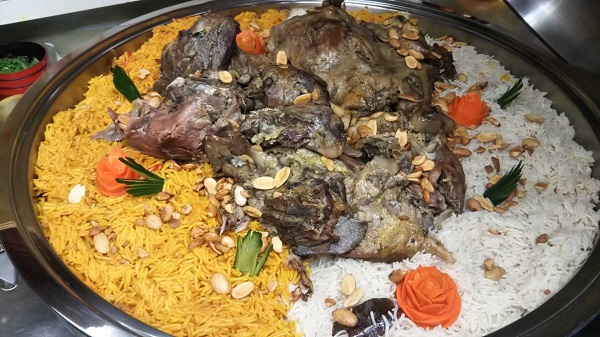
Whole Roasted Lamb
Syrian home cooking using yogurt and sesame sauce is recommended
Like Japan, Syria has four seasons, and its climate is not much different from Japan’s, except for the humid summer. While there are many similarities with Turkish cuisine, such as kebabs paired with tomato sauce and yogurt, chickpea hummus, and vegetable paste, the Syrian owner explains that the seasonings and use of condiments are slightly different. Pairing Mediterranean food with sesame sauce is a uniquely Syrian way of eating. The restaurant’s Masaka Mashwiya, which translates to grilled fish, is served with a Syrian-style sesame sauce. When we asked the Syrian staff about their favorite dish, they said the stew with yogurt sauce was their top recommendation. The shush barak here is a Syrian home-cooked dish of mutton dumplings simmered in yogurt sauce. These handmade dumplings are filled with plenty of minced mutton and have a chewy texture. The tartness of the yogurt and the rich flavor of cream stew create an addictive taste.
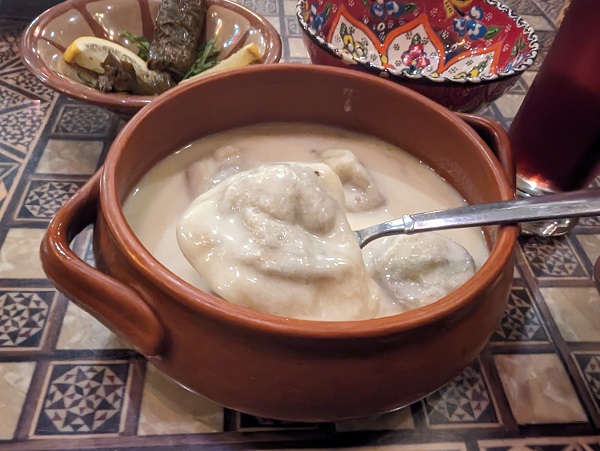
Shush Barak
In Turkey, there’s a dish called manti, which consists of small, ravioli-like dumplings covered in a yogurt sauce. However, these dumplings are larger and more filling than the Turkish dumplings. Syrian shush barak is more like a yogurt casserole dish with dumplings.
Interesting Arabic desserts beyond just vaklava! Crispy kunafeh and chewy halawat jubun
Zenobia offers a variety of unique Arabian sweets, including vaklava, a thin pastry filled with nuts and soaked in syrup; kunafeh, a milk custard topped with crispy deep-fried kadaif and baked in an oven; and a sweet, milky mochi-like cheesecake garnished with pistachios.
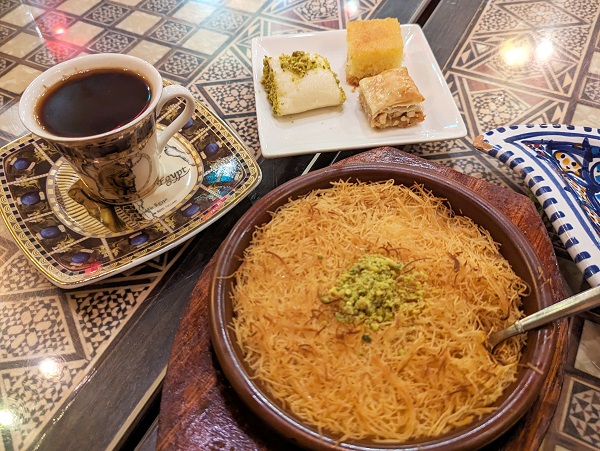
Kunafeh
Middle Eastern desserts are often twice as sweet as their Japanese counterparts, so we recommend pairing them with chai or Arabian coffee. Arabian coffee, rich with the aroma of cardamom, is carefully brewed each cup using water heated over an alcohol lamp. The equipment, reminiscent of something from the Arabian Nights, and the coffee cups exude an Egyptian atmosphere.
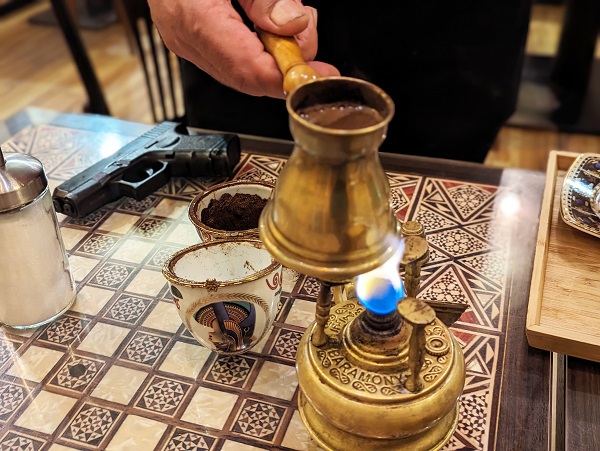
Arabian Coffee
Zenobia also offers many other interesting and unfamiliar menu items. The Arabic interior is lovely, with subtle qibla symbols and staff praying, creating a truly Islamic atmosphere. When you visit Zenobia in Hiroo, be sure to experience the charm of Islam along with Syrian and Middle Eastern cuisine.
Supervisor / Recommender

- Halal Supervisor and Foreigner Food Coordinator (Cooking, Consulting, Public Relations)
-
Click here for introduction
I currently work as an editor, but my previous job was as a chef, with many years of experience working in hospitals, restaurants, and the food service industry. Looking back, I think my connection to halal may have already been there.
Decades ago, I once worked in a cafeteria at an auction venue. Over 60% of the visitors were foreigners. Many Muslims were present, and the venue had a mosque-like prayer space. I remember being frequently asked questions about whether the meat was halal and what kind of meat it was. At certain times, the cafeteria would become as lively as a festival. The Indian restaurant next door would generously serve free biryani, curry, and sweet drinks to everyone who came. Over 100 people, including people wearing bright red turbans, galabeyas, and traditional attire, gathered in the cafeteria, all sitting around the same table and enjoying a truly enjoyable time. Looking back, it was iftar, the end of fasting, and I understand the significance of sharing, but at the time I was ignorant of halal and Islam, and didn't even consider how to respond. They only ate the curry made by the Indians in the restaurant. As I studied halal, I realized, "I wanted to eat Japanese food, but I couldn't." I regret not doing anything even though there was something I could have done.
If only it didn't contain pork! If only it didn't contain wheat or buckwheat! I could eat it... Food insecurity is different for each person.
That's why I think it's important to learn about the differences in culture, religion, and lifestyle that underlie it, and to create an environment where everyone can enjoy delicious meals in comfort.
The desire for delicious, safe, and secure food is universal. The times are calling for people to live in new ways that transcend borders and religions. I hope that halal can be a gateway to eliminating food insecurity, contributing even in some small way to a society where people can coexist and prosper with more liberal thinking, and to global harmony beyond.
Latest entries
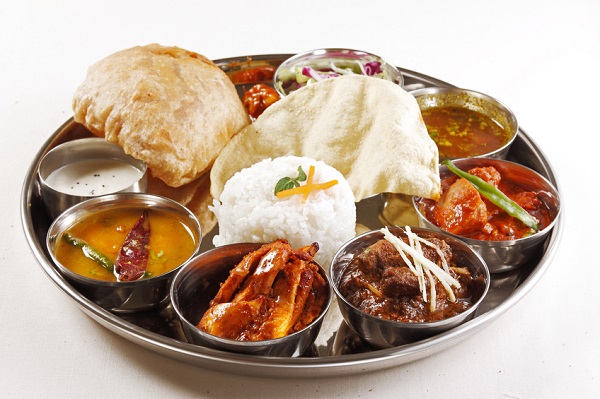 Tokyo2023年11月4日Dakshin South Indian Restaurant Otemachi Branch
Tokyo2023年11月4日Dakshin South Indian Restaurant Otemachi Branch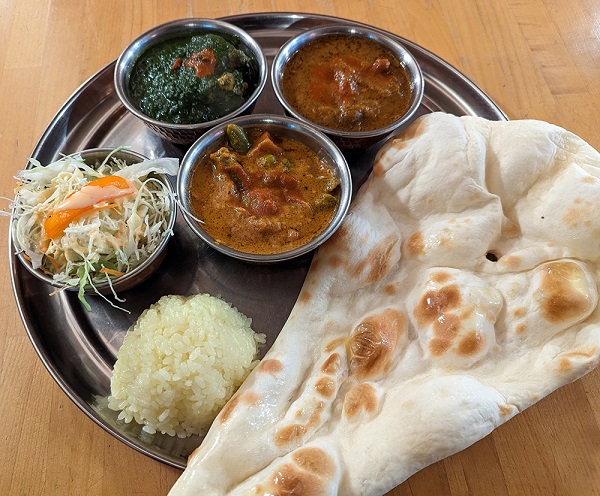 Tokyo2023年10月23日Gandhi Mahal
Tokyo2023年10月23日Gandhi Mahal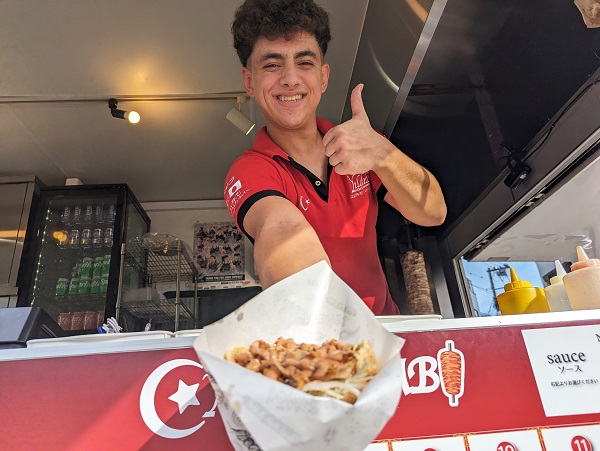 Tokyo2023年10月23日Yıldız KEBAB
Tokyo2023年10月23日Yıldız KEBAB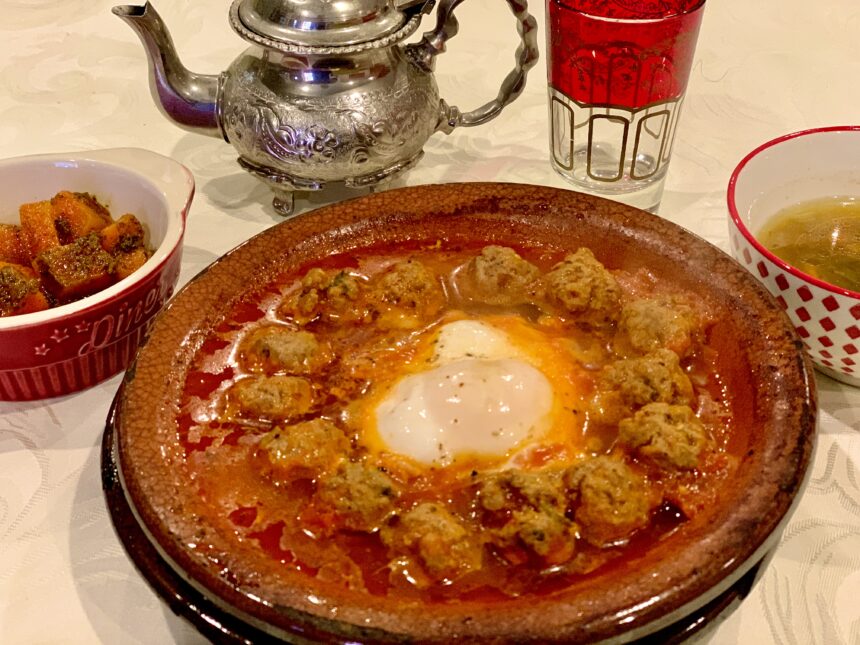 Tokyo2023年10月4日Restaurant Morocco
Tokyo2023年10月4日Restaurant Morocco

